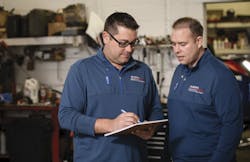SHOP STATS: Ulmer's Auto Care Location: Cincinnati Operator: Bryan Kauffeld Average Monthly Car Count: 530 Staff Size: 11 Shop Size: 4,031 sq ft Annual Revenue: $2.95 million
*All numbers are for the Cincinnati location
Steve Braun didn’t go out looking for his job as a service advisor at Ulmer’s Auto Care in Cincinnati. The position was offered to Braun by the two-location shop’s owner, Bryan Kauffeld, because of his ability to adapt to the needs of customers and jump right into conversation with people.
Kauffeld had firsthand experience of how good Braun was at meeting the needs of his customers. Before coming to work at Ulmer’s, Braun was a tire representative for Kauffman Tire and worked directly with Kauffeld.
Kauffeld, who is driven by numbers, expectations and thoroughness, noticed Braun embodied the characteristics most important to him when they were working together. Impressed by his customer service skills, Kauffeld offered Braun a position after observing an interaction between Braun and one of Kauffeld’s customers.
“He said the moment that he knew he wanted to hire me was a day that I came into the shop, walked right past him and started talking to a woman sitting in the waiting area,” Braun says.
Braun and the woman, who turned out to be Braun’s fourth-grade teacher, ended up having a 20-minute conversation. Seeing how easy it was for Braun to engage in conversation, Kauffeld knew he was the right fit for the job—everything else could be taught.
I don’t come from a technical background, so I had to go through a pretty intense training process to get where I am today. Now, I’m comfortable with the technical aspect of my job. I’m lucky enough to be a part of a really tight-knit team that includes Bryan and Wesley Adams, the shop’s other service advisor.
My day starts at 5 a.m. Bryan, Wesley and I go to the gym each morning and work out. We’re getting healthier and building a sense of camaraderie. We usually get into the office around 6:30. From 6:30–7, Wesley and I familiarize ourselves with who is coming in and making sure everything we need has been preordered.
The shop doesn’t actually open until 8 a.m., but from 7–8 a.m., customers are dropping their cars off. By the time 8 a.m. hits, we know exactly what work each of our technicians is getting and make sure everything has been delegated out.
Preparation and clarity are what have made us successful. Before the customer comes in, we know everything we can about him or her. I try and make sure I know a little bit about them—what part of town they live in, where their kids go to school, or something else to connect with them on a personal level. We also make sure to know why they’re coming in so we don’t have to ask again. I would say 97 percent of our business is from appointments. Because of this, we have the ability to plan ahead of time.
As soon as a customer comes in, we introduce ourselves right away and call them by name. After that, we set up clear and concise expectations. We ask questions ahead of time so we can find out what exactly they’re expecting of their experience and can exceed those expectations. We’ll underperform if we don’t ask the questions. You need to have that conversation. We make sure we know when they need the car back, when they’re expecting it back and the best way to reach them if something comes up.
Wesley and I really balance each other out. He’s very technical. He’s great with type-A, statistical people. I work well with the more emotional clients that come in. We’re both go-getters and run very well together. It’s definitely a team effort. It’s the Bryan, Wesley and Steve team.
Something that we’re working on for the new year is our labor rate. What I mean by this is that we’re getting paid for what we charge and that we’re not spending extra time that we haven’t billed trying to locate the problem. This is where setting those clear expectations comes into play.
If we bill $95 for an hour of time to test an engine, but it actually takes 2.5 hours—why is that? Are we having to take time to have a conversation with a customer? That expectation should have been set from the start. When we have the initial conversation, we say, “I’m going to authorize $95 plus tax to test and I will call you if it takes longer.” That way, we’re not having an awkward conversation later on where we’re having to charge them more. We make it clear that there’s a possibility that might happen. At the end of the day, people are happier if they know what to expect up front.
What I love about this job is that no day is the same. Once customers start rolling in at 8, I spend the day checking paperwork, making sure the inspection reports are clear, checking for warranties and managing any problems that come up during the day.
I get weekly reports where I can check on the efficiency of the technicians and the office. I’m always checking to see if there’s anything we may have missed. Bryan sets daily, weekly and monthly goals for us to hit. I also have a dashboard that I look at every two weeks that walks me through all of the money that we’re making and where exactly it’s going.
If we don’t hit those goals, I’ll always look at myself first. Is there anything I could be doing differently? We have a very open line of communication with our technicians. If I need to address something, we can have that candid conversation.
Our working day ends at 6 p.m. Yesterday, I didn’t leave until 7:30. I stay to wrap up any existing paperwork and make sure that everything is closed out and ready for our office manager, Donia Swisher. I look at the schedule to make sure that everyone has been called. If a car is still here, I’ll make the call—even if it’s after hours—to let the customer know what’s going on.
Today I had 23 cars coming in. Last night, I walked through each individual order. We had a few BMWs and Mercedes coming in, so I made sure the oil filters were ready. I structured my day ahead of time so when I walked in this morning, I had an idea of what it would be. Our whole team is very on top of that. I’m willing to put in an extra 5–7 hours per week to make sure that I know exactly what’s going on.
I am only one person at this company. I came into a very well-run family business. The team is what makes us so successful. I think it has everything to do with who we are and what we stand for. I couldn’t do it myself.

